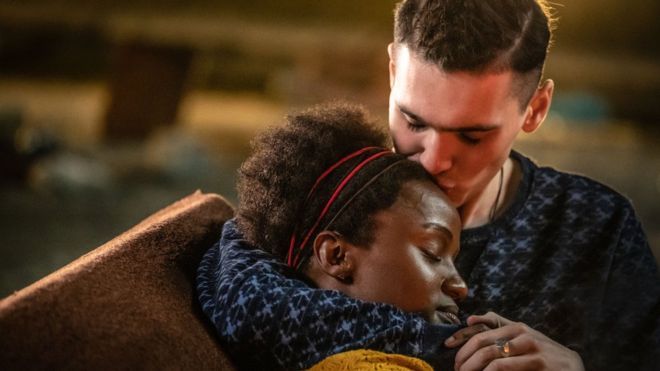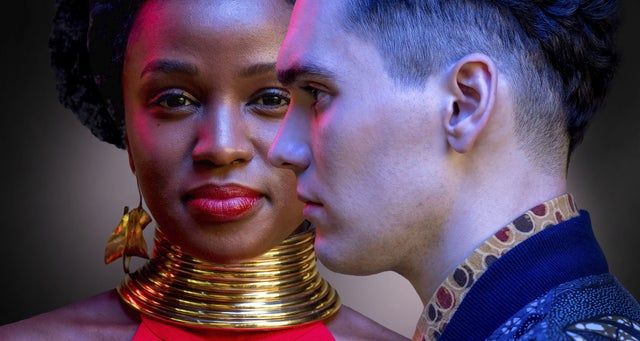By Maddy Raven, Second year, Theatre & Film
I feel I should give you fair warning that unlike a large number of people who took GCSEs in this country, I did not read Noughts + Crosses.
My parents somehow owned all of the series apart from the first book, and by the time I worked that one out, it didn’t occur to me to track down the first book. However, this means that I can provide slightly fresher eyes to the new BBC adaptation of the series.
So, what struck me first about Noughts + Crosses (2020) is the attention to detail: unlike some dystopian, alternate-world novels, the worldbuilding in this series has had some serious thought put into it. And it’s tiring always seeing the same trope of a normal white girl somehow being so different from everyone else and saving the world from itself with her sheer… girlness?
I feel similarly about forbidden love stories which concern two white, heterosexual people – we do seem to love fantasising about forbidden lovers when it’s been us doing the oppressing and keeping mixed-race and same-sex couples apart for years. Malorie Blackman and the creators of the show seem to have taken this opportunity to turn several of these tropes on their heads and make something which is still politically relevant, and less sickly-sweet than a fictional straight, white couple being torn apart.
| Do the Oscars really want diversity, or just to tick boxes?
Noughts + Crosses is the story of Sephy Hadley (Masali Baduza), the daughter of the Home Secretary, and a Cross, a member of the ruling black class. Callum McGregor, played by Jack Rowan, is the son of the Hadley’s servant, Meggie (Helen Baxendale), a Nought. When the two bump into each other when Callum is serving drinks at Sephy’s mother’s birthday party, Callum is struck by how beautiful Sephy has grown up to be.

He’s due to enroll in the military at ‘West Point’, alongside a few other Noughts, much to the dismay of many Crosses - this harkens back to segregation in the United States army, which technically ended in 1948, but took many more years to be put into effect. This also irks Callum’s older brother, Jude.
The relationship between Sephy and Callum is complicated by Jude’s ties with the Liberation Militia, a militant group of white radicals on Callum’s side, and Sephy’s position in Cross society as the daughter of the Home Secretary. Sephy’s boyfriend, Lakon, also poses a significant threat.
Some publications seem to be attempting to incite anger by trying to stir up some controversy about the show
When you notice that all of the bandages and plasters character apply to wounds in the show are brown, it’s jarring. Have you ever questioned why there’s only one kind of ‘skin coloured’ plaster? Will you now? Directors Julian Holmes and Koby Adom, alongside production designer Shane Bunce, have paid a phenomenal amount of attention to the micro and macroscopic effects of racism and turned them on their head.
Stormzy LOVES Noughts + Crosses 🙌
Posted by BBC iPlayer on Thursday, 26 March 2020
I’m sure a large part of this came from Malorie Blackman’s original novel, but seeing the difference in hair styles in the white actors, the inspired architecture used to reflect an England colonised by Africa rather than maintained by a predominantly white, Western regime, and the black faces dominating advertising and therefore the popularly accepted standard of ‘beauty’ was sobering.
| The list of Black nominations for Best Director is depressingly short
It’d be difficult not to also observe that all of the Facebook comments underneath the trailers and posters for this show that I’ve seen have been overwhelmingly positive, most likely due to Malorie Blackman’s impact as an author on my generation. However, some online news publications seem to be attempting to incite anger by drawing out the few negative comments there have been and trying to stir up some controversy about the show.
Hilariously, a headline stating 'Noughts and Crosses: Why was Josh Dylan angry with BBC show? "It’s horrible"', trying to entice you in with controversy, just turns out to be a second-hand account of his process of getting into character and realising how awful police brutality is…
Julian Holmes and Koby Adom, alongside production designer Shane Bunce, have paid a phenomenal amount of attention to the effects of racism
Dylan is not angry at the show, he’s angry at racism. As we should be. Watch the show for yourself and please, ignore the front-page attempts to try and get you to not tune in. It’s easier to keep us blind.
Featured: Courtesy of BBC
What do you think of the BBC's newest controversial adaptation?








